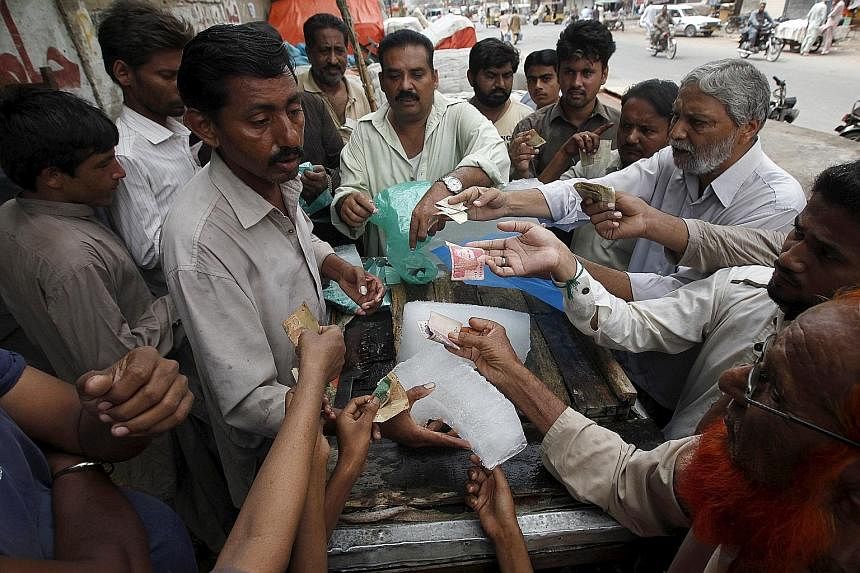ISLAMABAD - A heatwave in Pakistan's financial hub of Karachi and surrounding areas has killed about 2,000 people in the past two weeks, the most in recent memory.
Temperatures reaching 45 deg C have claimed about 1,500 lives in Karachi and 500 in other parts of southern Sindh province, according to Mr Anwaar Kazmi, a spokesman for rescue agency Edhi Foundation. Most of the victims had been elderly, he said.
A state of emergency is in force in hospitals, which are struggling to cope with the thousands of people affected by heatstroke and dehydration.
"There is no space left in the government hospitals to keep the dead bodies," Mr Kazmi said.
He added that the death toll was a record from a heatwave.
Temperatures reached 32 deg C in Karachi yesterday, which was declared a public holiday by the Sindh provincial government to encourage people to stay indoors out of the sun.
The hot weather will last until the end of the month, said Mr Afzal Sumera, deputy director of Pakistan's weather department in Islamabad.
In many ways, the emergency is the product of a perfect storm of meteorological, political and religious factors in Karachi.
Chronic shortages of water and electricity have exacerbated the impact of the heatwave in a crowded city of 20 million people that is normally ventilated by a sea breeze.
The health dangers are further exacerbated by the start of the Islamic fasting month of Ramadan, when most devout Pakistanis abstain from eating or drinking water during daylight hours.
For most people, that means about 15 hours with no source of hydration - a factor that has particularly affected manual labourers and street vendors, who work outside under the sun.
Dr Seemin Jamali, head of the Jinnah Postgraduate Medical Centre emergency wing in Karachi, said 272 people had died there from heat-related conditions, including dehydration.
Officials said a majority of the victims were men over the age of 50, especially day labourers from lower-income groups.
Although Karachi residents are used to dealing with other emergencies - stockpiling groceries, for example, during bouts of street violence - they seemed at a loss for how to manage the extended heatwave.
The electricity shortages - the product of decades-long mismanagement - mean power cuts that make air-conditioning units and ceiling fans useless and reduce the water supply by shutting down pumps. Ice is in short supply and being sold for a premium in many neighbourhoods.
Political anger over the crisis focused on the government of Prime Minister Nawaz Sharif, who had pledged to reduce the energy crisis when he came to power two years ago.
On the streets, people blamed politicians of all stripes. Over the past year, Mr Sharif's government has frequently appeared impotent during moments of crisis.
By contrast, the powerful military, led by General Raheel Sharif, has become an increasingly assertive force in public life.
Amid the political finger-pointing, some news media commentators called on politicians to voluntarily cut off their own electricity and experience the hardship endured by ordinary people.
Meanwhile, most residents have concentrated on escaping the suffocating heat. Television coverage showed residents fleeing their flats to seek shelter in the open streets.
NEW YORK TIMES, BLOOMBERG, AGENCE FRANCE-PRESSE

